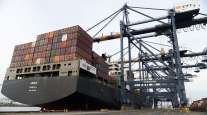Judge Orders Review of Deal Between Long Beach Port, ATA
This story appears in the July 25 print edition of Transport Topics. Click here to subscribe today.
A U.S. District Court in California reopened the nearly two-year-old arrangement that regulates truck environmental standards at the Port of Long Beach, part of the nation’s busiest container complex.
The July 14 order by Judge Christina Snyder in Los Angeles said the port must conduct an environmental impact review of its October 2009 settlement with American Trucking Associations.
That agreement between the port and ATA turned the Clean Truck Program at Long Beach from a concession agreement, which eliminated owner-operators, into a registration agreement regulating emissions. Snyder also ordered the port and the Natural Resources Defense Council to produce a joint report by July 28 outlining options on how to proceed.
An NRDC attorney hailed the judge’s order as an important development, while his counterpart with ATA characterized the order as a “procedural” change. A spokesman for the port expressed disappointment in the order.
“The program has already banned thousands and thousands of trucks with older engines,” said Art Wong, spokesman for the port. “About 10,000 of them have been banned from the port. We were on a pace that, by the end of this year, all of our requirements would have been met.”
The port’s policy is that only trucks with diesel engines that meet 2007 federal environmental standards or better should be allowed access, Wong said.
Robert Digges, chief counsel of ATA, said the status quo of the registration agreement should remain intact.
“The bottom line is that this judge has approved the registration agreement that is in place. The agreement meets the safety and environmental provisions that have been required, and there is RFID [radio-frequency identification] tracking for trucks and [Transportation Workers Identification Credential cards] for drivers,” Digges said.
Snyder’s order referred to an earlier legal decision and described the adoption of the registration agreement as “an activity taken by a public agency that ‘may cause a direct physical change or a reasonably foreseeable indirect physical change in the environment.’ ”
She said the port should have conducted an environmental review before the 2009 change and that failure to do so was a violation of the California Environment Quality Act.
Efforts by the Port of Long Beach and its larger neighbor, the Port of Los Angeles, to clean the air around the giant harbor complex, have caused a great deal of litigation.
The Los Angeles plan is under review by a panel of three federal appellate judges who heard arguments in June (6-20, p. 3). ATA is challenging the Los Angeles plan because it would require all of its port drivers to be employees of licensed motor carriers, thereby banning owner-operators.
While both ports started with a concession approach, eliminating owner-operators, they took separate paths in 2009 when Long Beach settled with ATA and adopted the registration agreement (11-23-09, p. 4).
A Port of Los Angeles spokesman said management is aware of Snyder’s most recent Long Beach order but that it is not applicable for Los Angeles.
The concession agreement made threats against drivers or trucking companies that were often ineffective, ATA’s Digges said. In contrast, the registration agreement sets up a system where specific trucks and drivers are held accountable for emission results without interfering in a company’s business model.
“Long Beach does more to check on a truck than Los Angeles does. I think the registration agreement will stay in force,” Digges said.
He also estimated that he expects a decision on Port of Los Angeles from the federal appellate panel between September and November.
Focusing on engine age is not enough, said David Pettit, senior attorney for NRDC.
“If you have a shiny new truck but you don’t maintain it, it will break down. If a driver doesn’t make enough money to maintain the vehicle properly, it will break down and we’ll be right back where we started. Look at the state of the fleet at the port before the program went into effect; it was a disaster,” Pettit said.
Therefore, NRDC wants licensed motor carriers, not owner-operators, to be held responsible for maintenance, Pettit said. He added that he thinks the judges in the Los Angeles case might render an opinion by August, not the fall.
Pettit said he was pleased with Snyder’s order, and he will seek to have as much of the registration agreement changed as possible while Long Beach is conducting the environmental impact review.
An initial review could take about six months to complete, Pettit said, and a follow-up review might be ordered, and that would take another six to 12 months to perform.
Depending upon the outcome of the environmental review, Pettit said, Long Beach could be required to alter its port policies so as to mitigate or eliminate the extra air pollution that might conceivably be caused by changing from the concession agreement to the registration agreement.
Wong said Long Beach port executives are meeting with attorneys, trying to figure out how to proceed. While there is uncertainty now, Wong said, they will know more after the July 28 meeting with Snyder.




